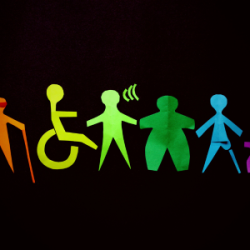When my second daughter had her first baby, Madison, she gave me a paperweight imprinted by the baby's outspread hand, two inches wide and two inches long. That tiny hand sits on my desk, rarely weighing paper down, except perhaps in the spring when my windows are open. Its imprint means that Madison is always here, touching me. Sometimes I see her handprint and stop to think about her, but more often my eyes pass over it as one more thing on my desk, one of several knickknacks given to me by children or grandchildren or picked up on the road or in a tourist trap. But even when my eyes just pass over that paperweight, her hand traces its presence in my life. All my keepsakes do that, remembering a trip, a person, a place, an event even when I am not conscious of them, bearing the light weight of another's touch and carrying it into my life above and beyond the attention I pay to it.
But Neruda's point is that my souvenirs are not the only things with such imprints of what is more than me. The old flatiron that holds my office door open, scavenged from a yard sale, bears the traces of someone's fingers, someone long forgotten but still traced, laboring in the thing before me. The small straight-backed oak chair beside my desk, rescued from the trash and designated for visitors, but usually filled with my bag, a coat, a hat or two, and a scarf, is another of Neruda's forgotten treasures scattered with love's blossoms. Their scent is slight, so slight as to be all but undetectable, often unnoticed. But it's there in the smoothness of the seat and the chip from the corner.
A box of pencils inherited from who-knows-where; a hoard of gum erasers waiting for me to use a pencil rather than a pen; a graduation medal for a Korean junior high school student fifty years ago, its origin forgotten; reading glasses not for me, not for anyone I know. Even the tile on my floor, shaped in some factory in Italy by machine and hardened in the fire of a computer-driven kiln—all these bear the traces of human fingers belonging to anonymous hands and are unavoidably touched by petals of human love from unknown and too often unknowing lovers.
The things that gather around me in life remind me of my humanity: I too will recede into the depths of others' forgetfulness, some whom I love, more whom I do not know. Yet my traces will remain in ordinary things left behind. The things that surround me remind me that I am surrounded by others like myself; they too live mostly in the ordinary, touching buttons, pencils, and tools as they go about their daily lives, leaving themselves in the traces of their touch.
Here too I can imagine someone who feels the same traces of others' touch in ordinary things, but who doesn't find in them the trace and touch of God. What can I say? I do.
*Pablo Neruda, "Ode to things," Odes to Common Things, trans. Ken Krabbenhoft (New York: Bullfinch Press, 1994) 14-15.





